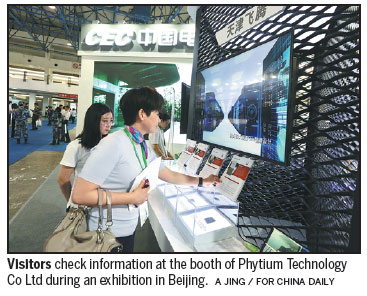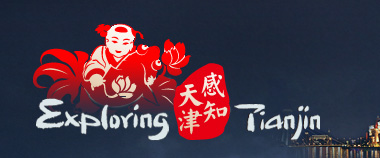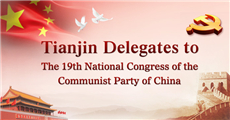Chinese chip producer Phytium Technology Co Ltd is planning to achieve sales of about 10 billion yuan ($1.57 billion) in the next five years, said a top company executive.
"The significant surge from the 50 million yuan in sales achieved last year will be driven by the industrial upgrade of State-owned enterprises and wider use of products by government authorities," said Gu Hong, general manager of Phytium Technology Co Ltd.
The company's ongoing projects include an overall energy upgrade system launched by China Huadian Corp Co and China's high-speed rail's telecommunication control system. In addition, the company is banking on expansion of high-speed rail projects to Belt and Road economies such as Indonesia.
Gu said Phytium is planning to beef up research and development, manufacturing competence and its adaptability to the "ecology" controlled by the operating systems, a market that is dominated by Intel chips with Windows system, and meet other challenges faced by domestic chip producers.
To tackle the challenges, Chinese firms could follow the example of UK-based Imagination Co, which produces chips that are compatible with various control processing units and operating systems.
Many CPU producers have decided to become stakeholders in Imagination, which enabled the latter to expand its market presence.
In addition, the era of smart phones has given ample opportunities to "overtake the corner" monopolized by the combination of Windows and Intel.
Bespoke chips including artificial intelligence chips as well as brain-inspired chips will represent the future of domestic chipmakers, she said.
Looking into the future, greater government investment is needed for the sector.
To build an ideal ecology for homemade chip makers, at least 400-500 million yuan is in critical need, insiders said.
Echoing Gu, Kong Jinzhu, president of the Tianjin Kylin Information Technology Co Ltd, a domestic operating system producer, said the Phytium plus Kylin combination is challenging the Intel and Windows combination.
However, he indicated that the combined investment for top the 10 Chinese operating system makers was no more than 1 percent of the figure of Microsoft.
yangcheng@chinadaily.com.cn

(China Daily 05/15/2018 page13)

 Daily life
Daily life




